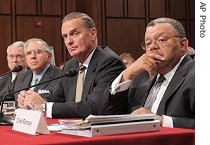2007年VOA标准英语-Congress Hears Skeptical Reports From Iraq(在线收听)
Capitol Hill
06 September 2007
A few days before Bush administration reports to Congress on the situation in Iraq, U.S. lawmakers have heard additional views on the capabilities and weaknesses of Iraqi military and police forces, and chances for political progress. VOA's Dan Robinson reports from Capitol Hill, where House and Senate panels received testimony from former military and government officials.
 |
| Members of the Iraqi Security Forces Independent Assessment Commission discuss commission's report during hearing of Senate Armed Services Committee on Capitol Hill, 06 Sept 2007 |
A key conclusion is that Iraqi security forces will be unable to assume primary responsibility for security within the next 18 months, and would still require substantial logistics and other support from the United States.
General Jones discussed another key aspect, namely a finding that Iraq's police forces and Ministry of Interior suffer from serious issues of competence as well as sectarian division:
"The commission has recommended disbanding and reorganizing the national police, which is judged to be overly sectarian - composed of 85 percent Shia policemen, heavy-handed in their mission execution, not trusted by people of other ethnic origins," said General Jones. "There are allegations of corruption that pervade the force as well."
The commission says a significant reduction of U.S. forces by early 2008 would be possible and prudent, and recommends that the role of U.S. troops be adjusted so they are not seen as an occupation force.
At the same time, Jones personally does not support a timeline for withdrawing U.S. forces, something congressional Democrats are likely to resume pressing for in upcoming legislation.
Lawmakers on two House committees also heard from two former military officers and a former U.S. defense secretary.
Retired Major General John Batiste says while Iraq's army is getting much better there is a long road ahead:
"We have a ways to go," said John Batiste. "We have yet to issue the Iraqi Army, those battalions and brigades that are stood up, the requisite equipment to fight the insurgent on an even playing field, to take our place. It has not happened yet, and quite frankly we are running out of time."
Retired General John Keane believes President Bush's military surge strategy is working, adding there would be serious consequences from a premature withdrawal:
"What would happen with a high degree of certainty, is a return to what we saw in 2006," said John Keane. "It would unleash the forces of evil that are in Iraq, to manipulate the people to their own personal gain, and we would return to a very high level of violence. What is check-mating that violence is the presence of security forces who are protecting the people."
Speaking to VOA by telephone, an Iraqi government spokesman Ali al-Dabbagh
agreed with findings about the ability of Iraqi security forces to assume full responsibility for security:
"We do understand and we do confirm and agree that we need more time, we need more effort, we need more training and more equipping in order to take full control," he said.
However, Yassin Majid, an adviser to Iraq's Prime Minister Nouri al-Maliki, took issue with the commission's findings in an interview with the Associated Press, calling them inaccurate and interference in Iraq's internal affairs.
Democrats and Republicans are citing the commission report and a separate highly-critical report by the U.S. Government Accountability Office in underscoring their support or opposition to President Bush's Iraq strategy.
Democrat Brian Baird sparked controversy after a recent visit to Iraq when he came out in support of giving President Bush's military strategy more time, with these comments to C-SPAN television:
"When one looks at the moral responsibility to the Iraqi people and our strategic interests in the region, a precipitous withdrawal right now when we are finally beginning to see some real progress and changes on the ground I think would be a terrible mistake," said Brian Baird.
John Boehner, the House Republican minority leader cautions against drawing conclusions before next week's testimony to Congress by Iraq commander General David Petraeus and the U.S. Ambassador to Iraq:
"We are all anxious to know what the next steps in Iraq are likely to be so that we can ensure success and ensure that Iraqis take greater control of their own destiny which would then allow our troops to begin coming home," he said.
However there were indications at week's end of increasing support from some Republicans in both chambers for various bipartisan legislative proposals to begin some form of U.S. troop withdrawals, although with no specific completion date.